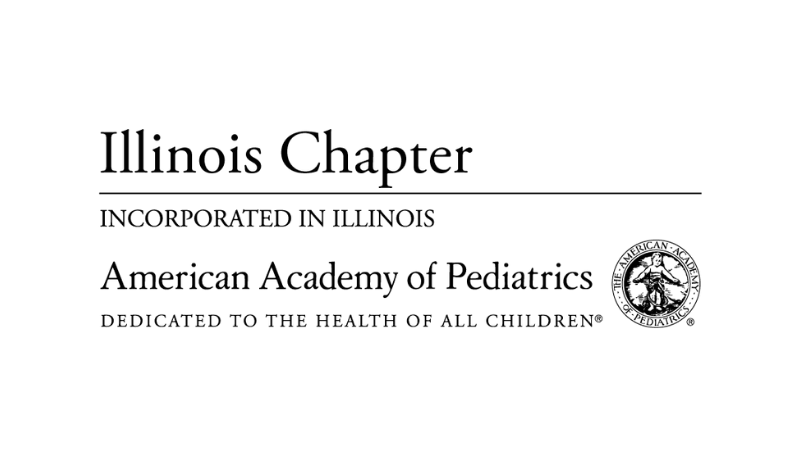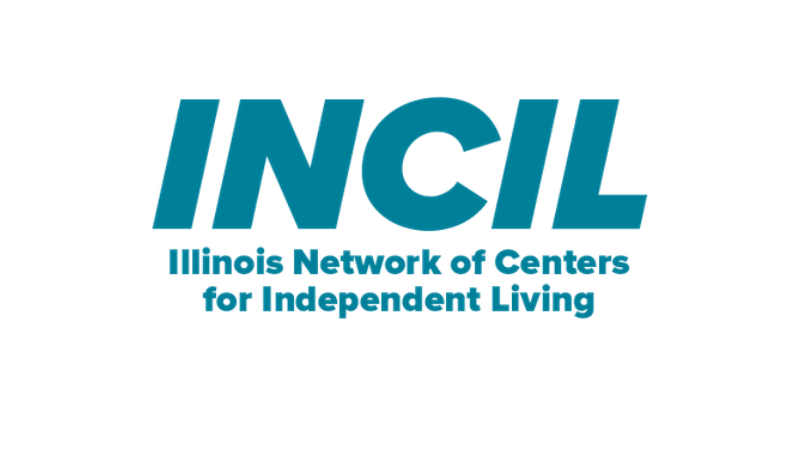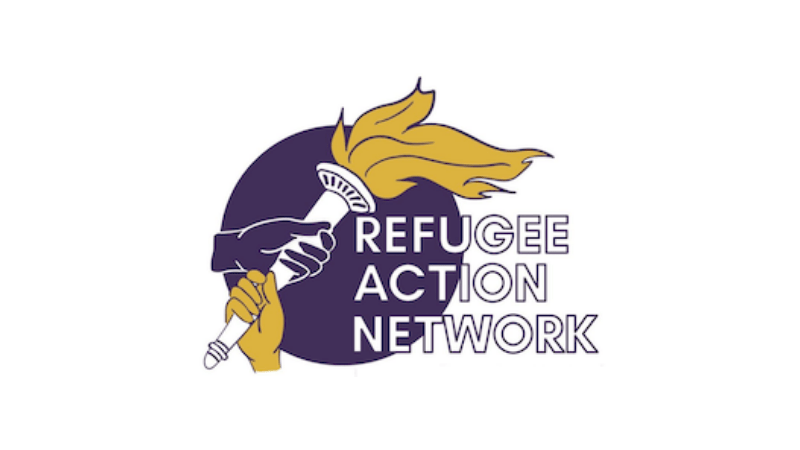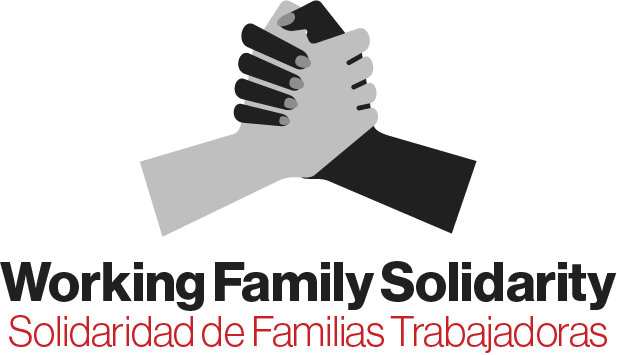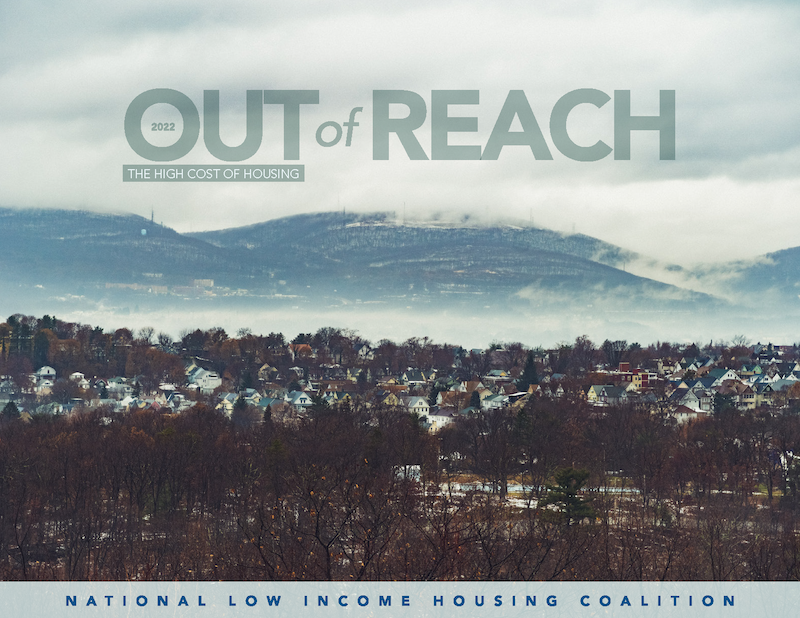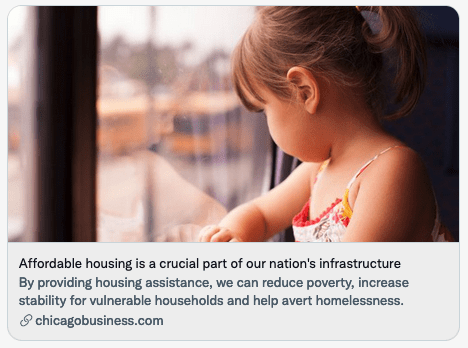Louder Together: Multi-Sector Partnerships
To truly change our affordable housing ecosystem for the better, we need to bring together not just housing advocates but also people, organizations, and interest groups from beyond the housing field. This is why Housing Action Illinois has joined the national Opportunity Starts at Home campaign, a project of our allies at the National Low Income Housing Coalition. We are working with advocates in pediatric health care, refugee resettlement, and the disability rights sector to raise up affordable housing as an issue that matters to all of us.
Mission
Build a movement with stakeholders from many sectors to generate widespread support for federal policies that correct long-standing racial inequities and economic injustices by ensuring quality housing for people with low incomes.
Vision
The nation’s historically marginalized households and those with the lowest incomes live in safe, accessible, affordable homes in neighborhoods that are free from discrimination and where everyone has equitable opportunities to thrive.
Our Partners
Illinois Chapter of the American Academy of Pediatrics (ICAAP) is an organization of approximately 2,000 pediatricians. Primary activities include advocacy on behalf of children, families, and health professionals in Illinois; the provision of continuing medical education and other resources for pediatricians, pediatric specialists, and other child health care providers; and collaboration with other state organizations and agencies on programs and projects that improve the health and well-being of children.
Illinois Network of Centers for Independent Living (INCIL) is the statewide association for Illinois’ 22 Centers for Independent Living (CILs). CILs are community-based, non-residential, non-profit organizations that are of, by and for persons with disabilities. CILs serve all people, regardless of their disability type. Each CIL has a staff and board of directors that is at least 51% people with disabilities. CILs help people with disabilities achieve maximum independence in work, school, housing and other parts of life.
Refugee Action Network (RAN) is a statewide advocacy coalition supporting the social integration of refugees in Illinois through public policy and community education. Our work focuses on communication, education, and advocacy to advance our collective vision.
We are committed to strengthening refugee families, creating welcoming communities, and celebrating the resilience, and unique value refugees contribute to our nation.
Working Family Solidarity educates and organizes low-wage workers to fight for labor and housing rights. We believe that worker rights must go hand-in-hand with housing rights for low-wage workers and their families to reach economic stability. To build the power to attain these changes, we must build stronger racial alliances among low-wage workers and build mutual trust and support. Our outreach includes families, community members, homeowners, renters and un-housed people.
Why partner on housing advocacy?
The Opportunity Starts at Home campaign enabled us to participate in a multi-sector coalition and build relationships with other Illinois organizations with common goals. Together, our Illinois coalition advocated for quality housing for those Illinois residents living in poverty. Through OSAH and Housing Action Illinois, we were able to present the significant health risks of housing insecurity on the development of young children and the critical need for affordable housing. We are grateful for this opportunity given the essential role of the U.S. Congress in determining robust and equitable federal housing policies to address the housing crisis across the nation.
As an organization that fights for labor rights and the creation of good jobs which are accessible to all people. We have learned that in order to help our families to attain a measure of security, they must have stable housing. We have worked closely together with Housing Action Illinois (HAI), and the Opportunity Starts At Home (OSAH) campaign of the National Low-Income Housing Coalition. Our housing advocacy has been exciting and fruitful with our collective efforts we have seen more funding for affordable housing in Illinois.
Stories about why affordable housing matters
Maria Teresa’s Story
A grandmother who has worked low-paying jobs for years, Maria Teresa has been forced to relocate twice during the past year . The first time, sky-rocketing rent made it impossible for Maria to stay in her home, which she has been living in for years. When she found an apartment not far away, she was hopeful that she could stay there for a long time as well, but her landlord soon informed her that the apartment would be renovated and she would be charged higher rent.
Today, Maria is living in yet another apartment in the neighborhood, and considers herself to be lucky for finding a place nearby. She thinks it is unfair that she works full-time and yet she can’t find a decent place to live.
Christopher’s Story
“Without subsidized housing, my clients will be paying 92% of their income towards housing,” Christopher Conan Calhoun says.
As an employee of an organization that works with people with disabilities, Christopher has seen how affordable housing can help clients focus on their mental and physical health and get off the streets. But that housing isn’t easy to find. It often takes a year and a half to find somewhere that is both affordable and accessible.
When a home is found, “Most of them [our clients] are filled with emotions because they are off the streets, car or underpass and now able to have their basic needs met.”
Amanda’s Story
“When you have a newborn baby, nobody wants to take you in,” Amanda says.
At 18, Amanda was working two jobs, trying to cover rent for her studio apartment, afford utility bills, and still meet her other expenses. But when she had her first child, the numbers stopped adding up.
Threatened with eviction, she gave up her apartment and started couch surfing, but it wasn’t easy to stay with other people while taking care of a baby–and then she became pregnant again. Although she figured out how to make ends meet and was able to receive housing assistance, it hasn’t been enough. Today, rent increases are pricing her out of the apartment where she lives with her two children. She is searching for an apartment in their old neighborhood, but with housing costs still on the rise, the pickings are slim, and she’s not sure she’ll be able to find a home that she can afford.
Mary’s Story
Mary’s hope is to find a two- bedroom, market-rate apartment that is wheelchair accessible for $800 or less per month. She receives $2,220 a month in SSDI income, and with taking care of a child, the money goes quickly. Right now,she is paying 30% of her income to rent while living with family. When she finds a place, she knows she may have to spend closer to half her monthly income on housing.
Partnership Highlights
Affordable Housing Is Out of Reach for the Lowest Income Renters In Illinois
Press release lifting up how the issue of rental affordability is particularly important to low-wage workers.
Affordable housing is a crucial part of our nation’s infrastructure
This joint op-ed, published by Crain’s Business Chicago and authored by Housing Action and ICAAP experts, urges readers and legislators to consider affordable housing a key part of our society’s infrastructure and explains how this is a matter of particular importance to families with young children.
Report: Rent ‘out of reach’ for most low-income families, experts hope Congress acts quickly
WGEM coverage of rental housing affordability and how this affects Illinoisans living with disabilities.
“Herring says this isn’t just an issue for low-income Illinoisans. He stressed affordable housing is a problem for all.”

Webinar on 2021 Illinois KIDS COUNT Report and Housing Issues
In July 2021, Housing Action Illinois joined ICAAP to discuss the role housing costs play and the substantial risks of housing instability on child health.


